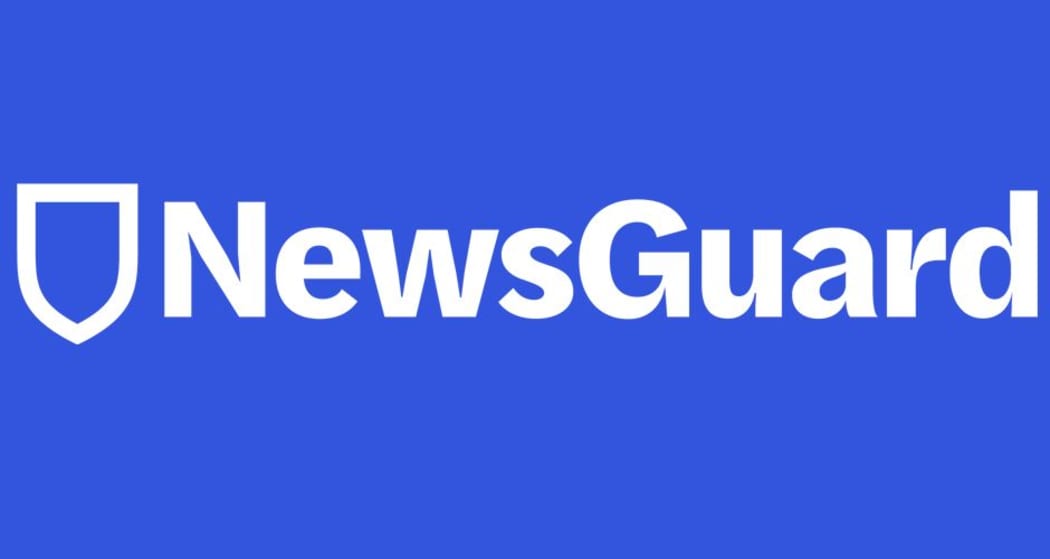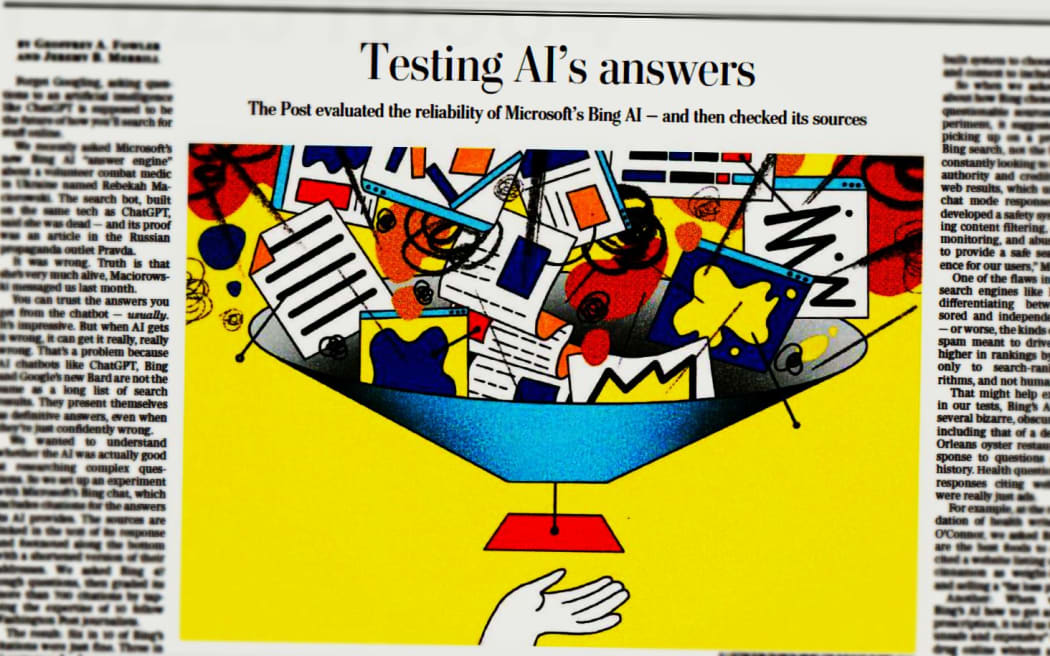US-based NewsGuard is rating New Zealand's significant news sites for reliability - and even preparing ‘nutrition labels’ to warn users to treat them with caution. NewsGuard is also using human journalists to train generative AI innovations like ChatGPT to minimise the potential for misinformation-spreading on an epic scale.

NewsGuard - the US-based outfit that's running the rule over online news sources in Australia and New Zealand. Photo: supplied
The revelation that three potential terror attacks since March 15 2019 had been thwarted made headlines recently when the bosses of our spy agencies reported back to Parliament.
But the acting boss of the SIS also told MPs malign foreign influence had been brought to bear on New Zealanders online.
Phil McKee named no names or nations, but his GCSB counterpart Andrew Hampton did when he said Kiwis were consuming misinformation from Russia.
“We’re not a social media censorship agency,” the prime minister said when asked what the government should do about that.
“The GCSB can identify where misinformation is coming into the country from - but what people choose to share on social media are matters for each individual to make decisions about,” he said.
A week later the latest AUT annual survey of New Zealanders’ trust in news revealed 86 percent of respondents said they were concerned about fake news on the internet.
But do online users know which sources of news they should believe?
It’s an international problem.
In March 2018 two former US editors tired of watching fake news proliferate - and the pushers of it profit - started NewsGuard to identify outlets hosting and spreading misinformation.
One was Steven Brill, the founder of Court TV and Brill's Content magazine among other ventures.
"We're going to solve that problem using - guess what? - human beings," Brill said on CNN when announcing the hiring of a team of journalists.
Two years later NewsGuard began to turn a profit and operated in in the US, UK, Canada, Germany, France, Austria and Italy.
Australia’s communications minister Michelle Rowland recently announced that the regulator there would enact an enforceable code against online misinformation if the media industry didn't enforce its own. And the same week, NewsGuard expanded its scrutiny to online news in Australia and New Zealand too.
“One of the great things about the internet is that everybody can be a publisher. One of the terrible things about the internet is that anybody can be a publisher,” NewsGuard’s other co-founder Gordon Crovitz - told Mediawatch.
“We thought this was a journalistic problem, not really a technological problem so we brought to it a journalistic solution, which is to identify nine basic apolitical criteria of journalistic practice,” said Crovitz, a former Wall Street Journal publisher.
“Does a site disclose its ownership? Does it have a corrections policy? We apply those nine criteria whether it's to a well-established operation like RNZ or a local digital startup,” he said.
“We also have what we call a ‘nutrition label’ which comes alongside the score for news consumers to learn about a source of news that they see in their news feed or in a search result,” he said.
How does it work?
“We have a browser extension so if you're using Chrome or Safari, or Firefox or Edge, consumers can sign up themselves,” he said.
“Alongside news stories (users) see a rating for the website from which a news story comes - a score from zero to 100. The user can hover over that score and see a pop-up that describes the site in some detail. If they want to learn even more, they can read the full ‘nutrition label’ which can be several thousand words,” he said.
Does NewsGuard actually filter out unreliable or low score sites, making a potential instrument of censorship?
“We're all journalists ourselves so we oppose censorship. But we work with the biggest global news aggregators as they consider adding a new source in their aggregation,” he said.
“The way to think about this is: crazy Uncle Willie has shared with me a news story from a source I've never heard of in my Facebook feed. I take a look to see what NewsGuard says about it. If it got a 15 out of 100 score, maybe I’ll let crazy Uncle Willie know,” Gordon Crovitz told Mediawatch.
Crovitz knows those who care about reliability of news sources will mostly be choosing ones they trust rather than checking up online. And those who are not concerned about reliability are unlikely to download NewsGuard’s browser extension and follow up on its alerts.
“For that reason, we work with partners like Microsoft that have integrated our ratings into some of their products,” Crovitz said.
“More than 90 percent of the people who have access to NewsGuard ratings are getting it through an intermediary such as Microsoft. We also are eager to find partners from libraries and other enterprises that want to help create a more trusted internet experience for their users,” Crovitz told Mediawatch.
Crovitz says several New Zealand news sources have already been assessed by NewsGuard’s Sydney-based operation.
“As we launch in each country we will have rated all the news and information sources that account for 95 percent of engagement. In New Zealand that includes the big broadcasters, the well known newspapers and also much smaller ones,” he said.

Gordon Crovitz, founder and co-CEO of NewsGuard. Photo: supplied
“Almost one in five news sites that NewsGuard rated in Australia and in New Zealand get untrustworthy scores. This is a higher percentage of engagement with low-reliability sites than in the U.K. (15 percent) or Canada (4 percent), but a lower percentage than in the US (46 percent), France (33 percent) or Germany (25 percent).” -- NewsGuard
“One in five is a large number, but it's far below the United States, which is at a whopping 46 percent or France which is 33 percent,” said Gordon Crovitz.
“RNZ has a 95 out of 100 score. There's one criterion I think having to do with giving information about your content creators, that you miss,” he said.
“But there are sites in New Zealand that . . . take a name that sounds like a trusted source and they publish misinformation. One is called The Daily Telegraph - not the one based in London, but daily telegraph.co.nz which publishes Russian disinformation and articles from RT and Sputnik,” he said.
NewsGuard estimates US$2.6 billion a year in advertising unintentionally supports online sources of misinformation. NewsGuard says it can help advertisers here ensure that their programmatic advertising doesn’t end up on misinformation websites.
Training the chatbots

The Washington Post cites NewsGuard's work weighing up the quality of generative AI tech when it comes to sifting reliable sources from dodgy ones. Photo: RNZ Mediawatch
NewsGuard also has a new mission - highlighting the danger of new generative AI applications and chatbots. Gordon Crovitz was on the front page of the New York Times recently calling ChatGPT “the most powerful tool for spreading misinformation that has ever been on the internet”.
“It can be a case of ‘misinformation in and misinformation out’. If the AI companies fail to train their models with the difference between reliable information and unreliable information, then it has the potential to be the most severe source of misinformation the world has ever seen,” Gordon Crovitz told Mediawatch.
“These AI models will create highly persuasive well written radio scripts or newspaper articles that are written beautifully, with perfect grammar, very eloquent - but completely false. The machines don't know the difference unless they're trained with the data,” he said.
“That's why we're pleased to be working with Microsoft which uses our data to train Bing Chat.
NewsGuard made headlines in the US recently testing the newest version of Chat GPT.
“We tested it on one hundred false narratives in the news to see how many it would spread. And it spread all one hundred. That surprised us because the earlier version from January - GPT 3.5 - only spread 80. So the AI can get even worse as the developers think they're making it better,” he said.
“With the right training machines can do better. And in the meantime, while it's still humans doing most of the work on news literacy, we're happy to be able to offer more information to news consumers about who's feeding them that news, whether it's in Facebook or on Twitter, or YouTube or in search,” he said.


